

Who am I? ... - MyST - My Support Team. Posted: Tuesday 30th March 2021 At MyST we are often asked to include some life story/journey work as part of our intervention with a child.
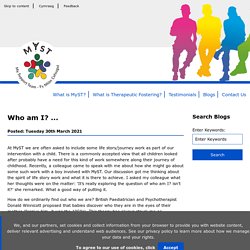
There is a commonly accepted view that all children looked after probably have a need for this kind of work somewhere along their journey of childhood. Recently, a colleague came to speak with me about how she might go about some such work with a boy involved with MyST. Our discussion got me thinking about the spirit of life story work and what it is there to achieve. I asked my colleague what her thoughts were on the matter: ‘It’s really exploring the question of who am I? International Review of Parent Advocacy in Child Welfare: Strengthening Children's Care and Protection Through Parent Participation.
Promoting parent and child participation is central to achieving children’s rights.
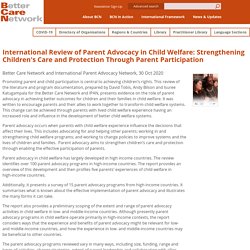
This review of the literature and program documentation, prepared by David Tobis, Andy Bilson and Isuree Katugampala for the Better Care Network and IPAN, presents evidence on the role of parent advocacy in achieving better outcomes for children and their families in child welfare. It was written to encourage parents and their allies to work together to transform child welfare systems. This change can be achieved through parents with lived child welfare experience having an increased role and influence in the development of better child welfare systems. Parent advocacy occurs when parents with child welfare experience influence the decisions that affect their lives. Characteristics of children entering care for the first time as teenagers. Last year, research from my office showed that even before the pandemic, there were 120,000 highly vulnerable children in England who were falling through the gaps in education and social care.
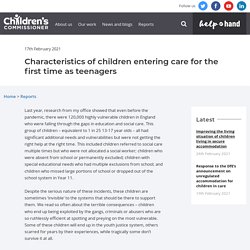
This group of children – equivalent to 1 in 25 13-17 year olds – all had significant additional needs and vulnerabilities but were not getting the right help at the right time. This included children referred to social care multiple times but who were not allocated a social worker; children who were absent from school or permanently excluded; children with special educational needs who had multiple exclusions from school; and children who missed large portions of school or dropped out of the school system in Year 11. Despite the serious nature of these incidents, these children are sometimes ‘invisible’ to the systems that should be there to support them. Social-pedagogy-strategy-and-implementation-plan. Is the UK government upholding the rights of children in care and care leavers? Is the UK government upholding the rights of children in care and care leavers?
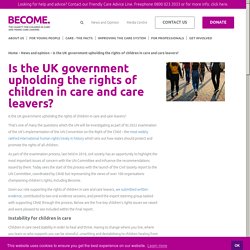
That’s one of many the questions which the UN will be investigating as part of its 2022 examination of the UK’s implementation of the UN Convention on the Right of the Child – the most widely ratified international human rights treaty in history which sets out how states should protect and promote the rights of all children. As part of the examination process, last held in 2016, civil society has an opportunity to highlight the most important issues of concern with the UN Committee and influence the recommendations issued by them. Today sees the start of this process with the launch of the Civil Society report to the UN Committee, coordinated by CRAE but representing the views of over 100 organisations championing children’s rights, including Become.
Natasha Hibbert Videographer / Editor Showreel. The Copenhagen house that's probably the best children's home in the world. A dolls’ house with shutters on the windows and tendrils of ivy painted on the walls stands opposite a dressing table adorned with stickers, trinkets and coloured hair-clips.
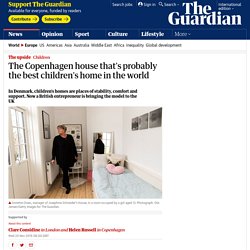
The room’s occupant is gesturing with sparkly nails, giving a tour of the premises and explaining how she picked out her own furniture and fittings from Ikea when she first arrived. This is Josephine Schneider’s House – a grand, 13-roomed residence built in 1906 in a leafy suburb of Copenhagen, funded by a Danish philanthropist of the same name to care for children who don’t have parents or whose parents can’t look after them.
Our nine-year-old tour guide has lived at Josephine Schneider’s House for two years. “I like it here,” she tells me. “I get to play with the bigger girls – they’re 13 – and we all got to go to Majorca this summer.” PANTS RULE! Basw_102026-4_2. About Us - National FASD. To Love is to Act - Mr Michael H Clarke Spoken Word. Tandfonline. 0308575917751999. Evaluating a contextual safeguarding system in Hackney. A new independent evaluation of the implementation of a contextual safeguarding system in a London borough has been published by Department for Education (DfE).
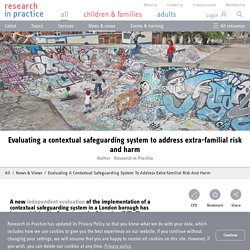
The evaluation, led by the University of Sussex in partnership with Research in Practice, was part of the second wave of DfE Innovation Programme funding. Contextual safeguarding theory provides a framework upon which to develop systems to address extra-familial risk and harm (EFRH) experienced by adolescents outside the family home, such as child sexual and criminal exploitation, peer-on-peer abuse, and gang affiliation.
Developed by Dr Carlene Firmin and her colleagues at the University of Bedfordshire, the contextual safeguarding framework includes individual practitioners working with young people to help them find safer ways of being. It also redirects the focus of professional assessment and intervention towards friendship groups, communities, real world spaces and virtual environments. Forest Hall home shut after 'at risk of death' Ofsted report. Image copyrightThe Percy Hedley Foundation A charity has closed its home for disabled children after inspectors said it posed a serious risk of death.
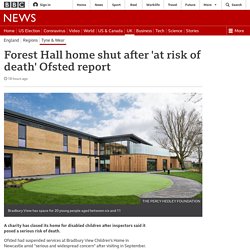
Ofsted had suspended services at Bradbury View Children's Home in Newcastle amid "serious and widespread concern" after visiting in September. Issues included staff not knowing the "complex" health needs of children causing one child "actual harm". Home owners the Percy Hedley Foundation said the coronavirus pandemic caused "a number of very concerning issues".
Adoption & Fostering Podcast - Accueil. Bereavement support for children - Co-op Funeralcare. We teamed up with Child Bereavement, Trauma and Emotional Wellbeing Service (CHUMS) to provide local schools, medical professionals, community groups and bereaved families with access to a series of short animated films.
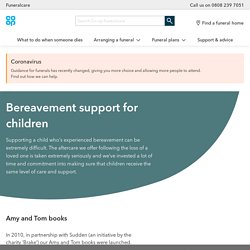
The films are aimed at helping bereaved children aged 7- 16 cope with the loss of a loved one and provide additional resource to relatives, teachers and other organisations who all play a role in supporting a child through their loss. The four animated films below include ‘Our Year Since Dad Died’ and ‘Our Year Since Grandma Died’ look at issues young people face when losing a parent or grandparent and focus on difficult dates such as Mother's Day, Father's Day and a family member's birthday providing practical guidelines on how to overcome these hurdles. Bereavement is a difficult subject for many and the reality is that in the UK a parent of a dependent child will die every 22 minutes, leaving 41,000 children without a parent each year. How Adverse Childhood Experiences Affect You as an Adult. Source: Shutterstock In California, where I live and work as a sex and intimacy disorders specialist, there is a movement for mandatory adverse childhood experiences (ACES) assessment in all public and private medical and psychotherapeutic settings.
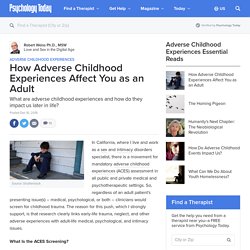
So, regardless of an adult patient’s presenting issue(s) – medical, psychological, or both – clinicians would screen for childhood trauma. "I need you to...": Stepping into the shoes of a child who has experienced trauma, loss & change. This blog is going to be written from the perspective of a child or young person who has experienced trauma, loss and/or significant change.
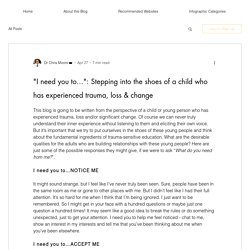
Of course we can never truly understand their inner experience without listening to them and eliciting their own voice. But it’s important that we try to put ourselves in the shoes of these young people and think about the fundamental ingredients of trauma-sensitive education. What are the desirable qualities for the adults who are building relationships with these young people? Here are just some of the possible responses they might give, if we were to ask “What do you need from me?”.
I need you to…NOTICE ME It might sound strange, but I feel like I’ve never truly been seen. Building Adult Capabilities to Improve Child Outcomes: A Theory of Change. Parentification: growing up too soon — Miriam Njoku. 1. Consciousness Being conscious of parentification and the potential consequences is the very first step. To stop creating the chaos they so hated in childhood in their adult relations, they need to accept/realise they were traumatised in childhood.
It is very difficult to escape the consequences as time goes by without healing. It is important to use language to describe the trauma, put words on what happened. Four out of five children in care have special educational needs. Four out of five children taken into care in England during their school years required support for special educational needs (SEN) at some point between the ages of five and 16, according to research. The study, which examined data on almost half a million children who began school in September 2005, found that of the 6,240 children who entered the care system during their school years, 83% required additional SEN support. Adoption not always best for children. We were concerned to read that the government has written to directors of children’s services, urging them to prioritise adoption for children in the care system (Local authorities urged to focus on adoption for children in care, 16 January). From 2016-18 we led an enquiry, commissioned by the British Association of Social Workers, into the role of the social worker in adoption.
We heard from those who had been adopted, adoptive parents, birth families, social workers, legal professionals and academics. While there was a recognition that adoption is suitable for some children, it was considered that it was not suitable for many of those who come into the care system. It is too stark in its severance of the legal relationship between those adopted and their birth family, and out of line with the emotional realities for most involved. The Invisibles: Children in Foster Care. For people who have recently lost a loved one, holidays that others seem to be happily celebrating are hard. For the uncountable thousands of children of refugees whom the United States government has taken from their parents and put in cages, isolation from their families must be excruciating. But what about the nearly half a million foster children in this country, who are even less visible than refugee children, rarely the subjects of media reports except in the case of a death or a lawsuit?
How are the holidays for current and former foster children? To be sure, some foster parents are loving and supportive, but far too often, being a foster child means something terrifyingly different. I learned this 40 years ago when I was working as a psychologist at the Toronto Family Court Clinic in Canada. Being a Foster Child. The Guardian view on unregulated children’s homes: a national scandal. There were several problems with last month’s announcement by the education secretary, Gavin Williamson, that the government would ban the placement of looked-after children under 16 in unregulated accommodation in England. The most obvious was that it is perfectly clear that this should have happened a long time ago. What on earth are we doing, is surely the only sensible reaction, upon learning that vulnerable younger teenagers (and teenagers in care are by definition vulnerable) are being placed in settings where they are not cared for? Of the 6,190 children living in such placements in March last year, 90 were under 16.
L.php?u= L.php?u= Disney Pixar and Erik Erikson's Eight Stages of Development. I tried to track down all the friends I grew up with in care – here’s what I ... When Lucy and I meet in the food court at the Arndale Centre in Manchester, it is the first time I have seen her for 15 years. 'You're weird, you're different and nobody wants to be your friend': the loneliness of FASD. Born addicted: Heroin's innocent victims. They Lied! Drug Prevention Video. Self-concept. Parentification: growing up too soon — Miriam Njoku. Teenagers and social networking – it might actually be good for them.
I ask a teenage girl, how often do you text? "250 times a day, or something," she tells me. Shocking! The digital lives of teenagers have become the target of weekly attacks. In a recent essay for the Guardian, the novelist Jonathan Franzen bemoaned online socialising, arguing that it was creating a uniquely shallow and trivial culture, making kids unable to socialise face to face. Then the American comedian Louis CK proclaimed on TV that he wouldn't give his daughters cellphones for fear they wouldn't develop empathy. Privatising children's homes is 'playing into the hands of abusers' The increasing privatisation of children’s care homes is “playing into the hands of abusers” and putting children in danger of exploitation, according to a new report, seen by the Observer.
Market forces are being allowed to dictate the housing and care of vulnerable children over their best interests, the study concludes, putting them at greater risk from “county lines” drug gangs that are known to target homes. HO-County-Lines-Partner-Pack. Craig Pinkney: ‘Young people caught up in gang violence are traumatised’ With gun and knife crimes, including fatalities, hitting the headlines with disturbing regularity and affecting many young people around the country, Craig Pinkney has found himself in demand. The Birmingham-based youth worker and criminologist, who has been immersed in efforts to understand and tackle serious youth violence and gangs since he was a teenager, says there needs to be a rethink about how the issue is addressed. In the West Midlands, police were dealing with 14 knife offences every day last year, according to freedom of information figures, while official statistics showed a worrying increase in gun crimes.
Pinkney believes that the susceptibility of young people to serious street violence warrants a “public health” approach. The Invisibles: Children in Foster Care. Thousands of siblings split up in care system. Image copyright Theighan More than 12,000 children in care are not living with at least one of their siblings, the BBC has discovered. Time for The Child Welfare System to Stop Confusing Poverty With Neglect. As a field, we are fond of saying that child abuse and neglect cross all economic strata, but we know that it is not reported or handled equally or proportionally across all strata, as reflected by the children and families involved in the child welfare system.
There is also a common refrain among many in the field that we should create a system that is “good enough for our own children.” While the sentiment is earnest, we know that for most of us, the system will never be truly good enough for the children in our own lives. The truth is, for most people of certain socioeconomic standing and race, removal of a child to foster care is not a reality they will ever face — whether warranted or not. Moreover, to make that statement and mean it requires a fierce urgency in making the changes necessary to bring such a system to life. Adoption is not always best for children.
James example guide for a life story book. How I am fighting the stereotypes of looked after children. "We don't care if you don't get the grades, but you have to go to the lessons or we won't get paid for you" These words were said to me by my school teacher – someone who should encourage a child to succeed. Strathprints027410.pdf. When it comes to supporting Care Experienced people, don't forget the nod - w... Social workers, please learn from my experience in care. Do we think enough about love for children in care? Children in out-of-area residential care 'let down' by social workers. Hugman.catriona_phd. Managing Contact - Family Rights Group. Beyond_contact_Boddy_web. Final20Siblings20Summary. Childhood vulnerability in England 2019.
"I’m AdvoCat and I’m here to help you" - Coram Voice. -looked-after-mind-report. Notforgotten-theimportanceofkeepingintouchwithformerfostercarers. Children's Commissioner for England. Cco-childrens-voices-childrens-experiences-of-instability-in-the-care-system-... Increase in teenagers being taken into care in relation to CSE and. TACT-Language-that-cares-2019_online. The Copenhagen house that's probably the best children's home in the world. How Does Technology Affect Teens? – NHSPress. Forms of Emotional and Verbal Abuse You May Be Overlooking. It Gets Better. Understanding and treating survivors of incest - Counseling Today. Www.freewebs.com/australianprisonfoundation/Explaining prison to children.pdf.
Biting, Pushing, Pulling Hair—Helping Children with Aggression. Challengingbehavior.fmhi.usf.edu/do/resources/documents/sek_cap_booklet.pdf. 10 Excellent Books for Children about Death. What Secure Attachment Really Is, and How to Create It (It’s Not What You Think) – Rearranged By Motherhood. Overview of ACEs - Adverse Childhood Experiences (ACEs) - Children - Populati...
Young people who seek support online being accused of 'sadfishing' 'No child should be moved away': why councils are opening new children's home... New-blueprint-for-childrens-social-care. I grew up in care. I wanted to break the cycle and be the good parent I didn'... I lived in a children’s home at 14, and was shocked by how quickly staff had ... Secure Accommodation Orders. Explaining the Brain to Children and Adolescents.
Female sexual abuse: The untold story of society's last taboo - Taboos & Tolerance - Love & Sex. Empowering Parents. Discussing Teenage Defiance. Triple P - For Parents. How We Help. The application of motivational interviewing techniques for engaging "resistant" families. DCSF-RR111. Engaging Families & Working with Resistance. Victoria Climbie Inquiry. What Were You Thinking!?! Understanding the Teenage Brain. TEDxHerndon.